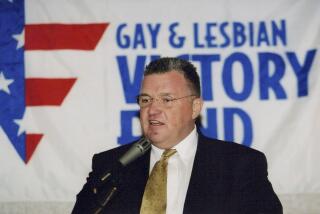Bryce Harlow, Adviser to Presidents, Dies
WASHINGTON — Bryce N. Harlow, the first adviser Richard M. Nixon appointed after he was elected President in 1968 and the man who later warned Nixon that White House aides John W. Dean III, H. R. Haldeman and John D. Ehrlichman would have to leave “if they have undertaken actions which will not float in the public domain,” died Tuesday in a hospital near here.
He was 70 and had been admitted to Arlington Hospital in Arlington, Va. for treatment of a chronic lung disorder.
Harlow, who was retired, also served as an informal adviser to Presidents Dwight D. Eisenhower and Gerald R. Ford, and his advice was sought by both Democrats and Republicans in and out of Congress. At various times during both the Nixon and Eisenhower administrations, Harlow was considered the chief White House congressional adviser.
“He was quite a man, a political activist who spent a lifetime in service to his country,” said Senate Minority Leader Bob Dole in a eulogy on the Senate floor. “He never hesitated to offer his services when problems on Capitol Hill or the White House seemed too big to solve.”
Melvin R. Laird, defense secretary under Nixon, issued a statement saying, “The nation has lost a dedicated servant and I a true friend.”
Harlow’s son, also named Bryce, is an adviser to President Reagan.
The senior Harlow, a graduate of the University of Oklahoma, first came to Washington in 1938 as an assistant librarian in the House of Representatives. He was commissioned a lieutenant colonel in the Army in World War II and worked in the Pentagon as a public and congressional relations man.
He returned to his family’s book publishing business after the war, but Eisenhower lured him back to Washington shortly after his inauguration in 1953. He was a White House speech writer for five years, and then became Eisenhower’s deputy assistant for congressional relations.
Witty, articulate and self-effacing, Harlow liked to joke that it was easy for him to maintain a low profile through three administrations. “After all,” he told a Los Angeles Times reporter in 1970, “I’m only 5 foot 4.”
Oval Office Access
He was one of the few men who could knock on either Eisenhower’s or Nixon’s door at any time for some conversation. That easy access made him a prime target of lobbyists and congressmen working for special-interest legislation. It also made him such a trusted adviser that Nixon heeded his advice to send Dean, Haldeman and Ehrlichman packing during the Watergate scandal.
One of Harlow’s virtues was that he was considered apolitical, although he served only Republican administrations. He was credited with an uncanny prescience in predicting how Congress would vote on pending legislation.
After Eisenhower left office, Harlow became Procter & Gamble’s Washington representative. He returned to the soap manufacturing firm after Jimmy Carter’s election.
More to Read
Sign up for Essential California
The most important California stories and recommendations in your inbox every morning.
You may occasionally receive promotional content from the Los Angeles Times.










